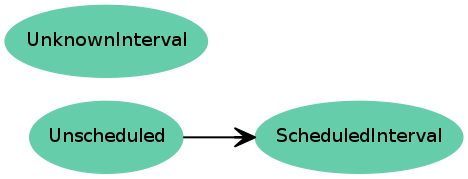bridgedb.schedule¶
This module implements functions for dividing time into chunks.

-
KNOWN_INTERVALS= ['second', 'minute', 'hour', 'day', 'week', 'month']¶ The known time intervals (or periods) for dividing time by.
-
exception
UnknownInterval[source]¶ Bases:
exceptions.ValueErrorRaised if an interval isn’t one of the
KNOWN_INTERVALS.
-
toUnixSeconds(timestruct)[source]¶ Convert a datetime struct to a Unix timestamp in seconds.
Parameters: timestruct ( datetime.datetime) – Adatetimeobject to convert into a timestamp in Unix Era seconds.Return type: int
-
fromUnixSeconds(timestamp)[source]¶ Convert a Unix timestamp to a datetime struct.
Parameters: timestamp (int) – A timestamp in Unix Era seconds. Return type: datetime.datetime
-
interface
ISchedule[source]¶ An
Interfacespecification for a Schedule.-
intervalPeriod¶ The type of period which this Schedule’s intervals will rotate by.
-
intervalStart(when=None)¶ Get the start time of the interval that contains when.
-
getInterval(when=None)¶ Get the interval which includes an arbitrary when.
-
nextIntervalStarts(when=None)¶ Get the start of the interval after the one containing when.
-
-
class
Unscheduled(count=None, period=None)[source]¶ Bases:
objectA base
Schedulethat has only one period that contains all time.>>> from bridgedb.schedule import fromUnixSeconds >>> from bridgedb.schedule import Unscheduled >>> timestamp = 1427769526 >>> str(fromUnixSeconds(timestamp)) '2015-03-31 02:38:46' >>> sched = Unscheduled() >>> start = sched.intervalStart(timestamp) >>> start -62135596800 >>> str(fromUnixSeconds(start)) '0001-01-01 00:00:00' >>> sched.getInterval(timestamp) '1970-01-01 00:00:00' >>> next = sched.nextIntervalStarts(timestamp) >>> next 253402300799 >>> str(fromUnixSeconds(next)) '9999-12-31 23:59:59'
Create a schedule for dividing time into intervals.
Parameters: - count (int) – The total number of period in one interval.
- period (str) – One of the periods in
KNOWN_INTERVALS.
-
intervalStart(when=0)[source]¶ Get the start time of the interval that contains when.
Parameters: when (int) – The time which we’re trying to find the corresponding interval for. Return type: int Returns: The Unix epoch timestamp for the start time of the interval that contains when.
-
getInterval(when=0)[source]¶ Get the interval that contains the time when.
Parameters: when (int) – The time which we’re trying to find the corresponding interval for. Return type: str Returns: A timestamp in the form YEAR-MONTH[-DAY[-HOUR]]. It’s specificity depends on what type of interval we’re using. For example, if using"month", the return value would be something like"2013-12".
-
class
ScheduledInterval(count=None, period=None)[source]¶ Bases:
bridgedb.schedule.UnscheduledAn class that splits time into periods, based on seconds, minutes, hours, days, weeks, or months.
>>> from bridgedb.schedule import fromUnixSeconds >>> from bridgedb.schedule import ScheduledInterval >>> timestamp = 1427769526 >>> str(fromUnixSeconds(timestamp)) '2015-03-31 02:38:46' >>> sched = ScheduledInterval(5, 'minutes') >>> start = sched.intervalStart(timestamp) >>> start 1427769300 >>> current = sched.getInterval(timestamp) >>> current '2015-03-31 02:35:00' >>> current == str(fromUnixSeconds(start)) True >>> next = sched.nextIntervalStarts(timestamp) >>> next 1427769600 >>> str(fromUnixSeconds(next)) '2015-03-31 02:40:00' >>> later = 1427771057 >>> str(fromUnixSeconds(later)) '2015-03-31 03:04:17' >>> sched.getInterval(later) '2015-03-31 03:00:00'
Variables: - intervalPeriod (str) – One of the
KNOWN_INTERVALS. - intervalCount (int) – The number of times
intervalPeriodshould be repeated within an interval.
Create a schedule for dividing time into intervals.
Parameters: - count (
intorstr) – The total number of period in one interval. - period (str) – One of the periods in
KNOWN_INTERVALS.
-
_setIntervalCount(count=None)[source]¶ Set our
intervalCount.Attention
This method should be called before
_setIntervalPeriod(), because the latter may change the count, if it decides to change the period (for example, to simplify things by changing weeks into days).Parameters: count (int) – The number of times the intervalPeriodshould be repeated during the interval. Defaults to1.Raises UnknownInterval: if the specified count was invalid.
-
_setIntervalPeriod(period=None)[source]¶ Set our
intervalPeriod.Parameters: period (str) – One of the KNOWN_INTERVALS, or its plural. Defaults to'hour'.Raises UnknownInterval: if the specified period is unknown.
-
intervalStart(when=0)[source]¶ Get the start time of the interval that contains when.
Parameters: when (int) – The time which we’re trying to determine the start of interval that contains it. This should be given in Unix seconds, for example, taken from calendar.timegm().Return type: int Returns: The Unix epoch timestamp for the start time of the interval that contains when.
-
getInterval(when=0)[source]¶ Get the interval that contains the time when.
>>> import calendar >>> from bridgedb.schedule import ScheduledInterval >>> sched = ScheduledInterval(1, 'month') >>> when = calendar.timegm((2007, 12, 12, 0, 0, 0)) >>> sched.getInterval(when) '2007-12' >>> then = calendar.timegm((2014, 05, 13, 20, 25, 13)) >>> sched.getInterval(then) '2014-05'
Parameters: when (int) – The time which we’re trying to find the corresponding interval for. Given in Unix seconds, for example, taken from calendar.timegm().Return type: str Returns: A timestamp in the form YEAR-MONTH[-DAY[-HOUR]]. It’s specificity depends on what type of interval we’re using. For example, if using"month", the return value would be something like"2013-12".
- intervalPeriod (str) – One of the